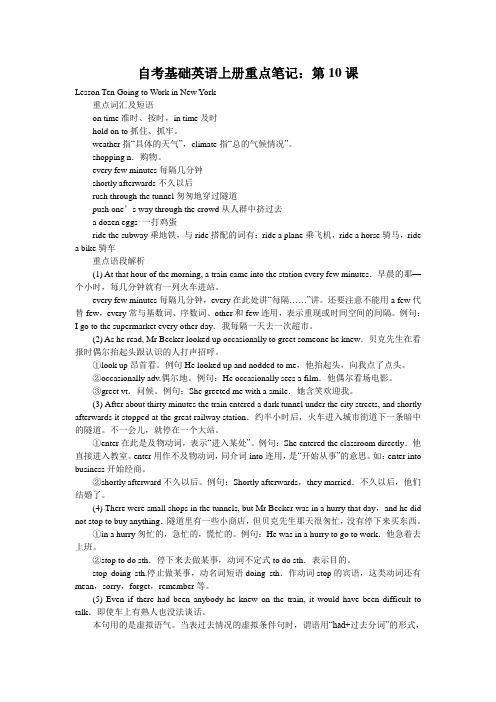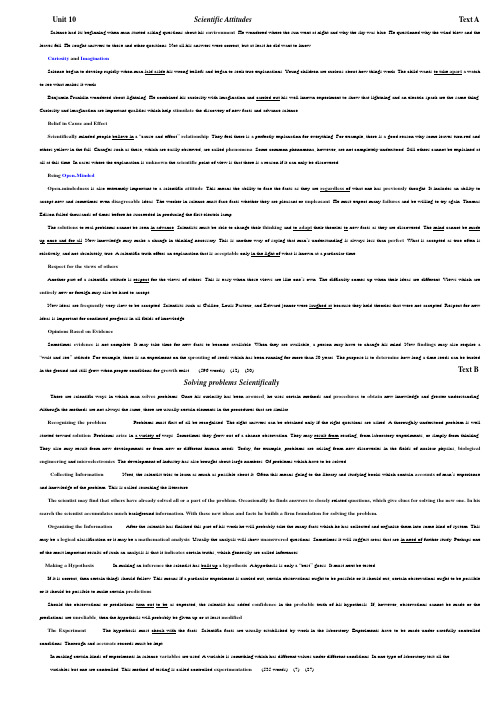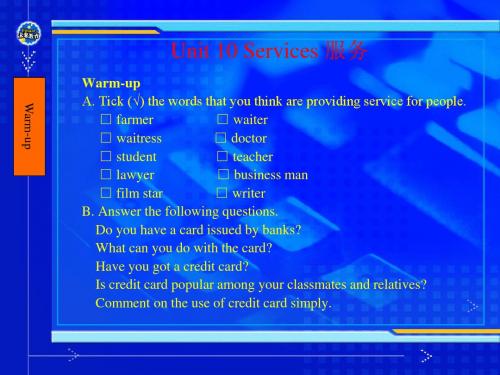自考英语Unit 10 PPT
- 格式:ppt
- 大小:404.50 KB
- 文档页数:48


Unit10Text A Working Women --— East and West 东西方的职业妇女Work,for most American and Chinese women aged 55 and under,involves responsibility( n.责任,责任心;职责) for a household,a child or children,and a job outside the home as well (也).It all adds up to a busy life.对于大多数55岁或55岁以下的美国妇女和中国妇女来说,工作包括家务、照顾一个或几个孩子以及一份家庭以外的工作,所有这些加起来就是忙碌的生活。
How is it going for them —for us?她们现在的情况怎么样?我们中国的情况又怎么样呢?Experts have observed [ vt.&vi.观察] that life forms a different sort of (adv.有几分地a.有几分地) pyramid for women in China than in the United States.专家学者已经注意到,对中美两国妇女来说,生活形成的“金字塔”形状各不相同。
In China,nearly all young mothers are employed(被雇佣) outside the home,with their numbers decreasing [ vt./vi./n.减小,减少] as they approach middle age.在中国,几乎所有年轻的母亲都有职业,但随着年龄步人中年,人数越来越少。
The reasons are clear:the second income of the woman is an absolute(绝对的) necessity(必要性) for a young family with a child or two.原因很清楚:对于有一两个孩子的夫妇来说,妻子的这第二笔收入绝对是必要的。


自考基础英语上册重点笔记:第10课Lesson Ten Going to Work in New York重点词汇及短语on time准时、按时,in time及时hold on to抓住、抓牢。
weather指“具体的天气”,climate指“总的气候情况”。
shopping n.购物。
every few minutes每隔几分钟shortly afterwards不久以后rush through the tunnel匆匆地穿过隧道push one’s way through the crowd从人群中挤过去a dozen eggs 一打鸡蛋ride the subway乘地铁,与ride搭配的词有:ride a plane乘飞机,ride a horse骑马,ride a bike骑车重点语段解析(1) At that hour of the morning, a train came into the station every few minutes.早晨的那—个小时,每几分钟就有一列火车进站。
every few minutes每隔几分钟,every在此处讲“每隔……”讲。
还要注意不能用a few代替few,every常与基数词、序数词、other和few连用,表示重现或时间空间的间隔。
例句:I go to the supermarket every other day.我每隔一天去一次超市。
(2) As he read, Mr Becker looked up occasionally to greet someone he knew.贝克先生在看报时偶尔抬起头跟认识的人打声招呼。
①look up昂首看。
例句He looked up and nodded to me,他抬起头,向我点了点头。
②occasionally adv.偶尔地。
例句:He occasionally sees a film.他偶尔看场电影。

Unit 10 Scientific Attitudes Text A Science had its beginning when man started asking questions about his env ironment. He wondered where the sun went at night and why the sky was blue. He questioned why the wind blew and the leaves fell. He sought answers to these and other questions. Not all his answers were correct, but at least he did want to know.Curiosity and ImaginationScience began to develop rapidly when man laid aside his wrong beliefs and began to seek true explanations. Y oung children are curious about how things work. The child wants to take apart a watch to see what makes it work.Benjamin Franklin wondered about lightning. He combined his curiosity with imagination and carried out his well-known experiment to show that lightning and an electric spark are the sam e thing. Curiosity and imagination are important qualities which help stimulate the discovery of new facts and advance science.Belief in Cause and EffectScientifically minded people believe in a “cause-and-effect’’relationship. They feel there is a perfectly explanation for everything. For example, there is a good reason why some leaves turn red and others yellow in the fall. Changes such as these, which are easily observed, are called phenomena. Some common phenomena, however, are not completely understood. Still others cannot be explained at all at this time. In cases where the explanation is unknown the scientific point of view is that there is a reason if it can only be discovered.Being Open-MindedOpen-mindedness is also ex tremely important to a scientific attitude. This means the ability to face the facts as they are regardless of what one has previously thought. It includes an ability to accept new and sometimes even disagreeable ideas. The worker in science must face facts whether they are pleasant or unpleasant. He must expect many failures and be willing to try again. Thomas Edison failed thousands of times before he succeeded in producing the first electric lamp.The solutions to real problems cannot be seen in advance. Scientists must be able to change their thinking and to adapt their theories to new facts as they are discovered. The mind cannot be made up once and for all. New knowledge may make a change in thinking necessary. This is another way of saying that man’s understanding is always less than perfect. What is accepted as true often is relatively, and not absolutely, true. A scientific truth offers an explanation that is acceptable only in the light of what is known at a particular time.Respect for the view s of othersAnother part of a scientific attitude is respect for the views of others. This is easy when these views are like one’s own. The difficulty comes up when their ideas are different. V iews which are entirely new or foreign may also be hard to accept.New ideas are frequently very slow to be accepted. Scientists such as Galileo, Louis Pasteur, and Edward jenner were laughed at because they held theories that were not accepted. Respect for new ideas is important for continued progress in all fields of knowledge.Opinions Based on EvidenceSometimes evidence is not complete. It may take time for new facts to become available. When they are available, a person may have to change his mind. New findings may also require a “wait-and-see’’ attitude. For example, there is an experiment on the sprouting of seeds which has been running for more than 50 years. The purpose is to determine how long a time seeds can be buriedin the ground and still grow when proper conditions for growth exist. (596 words) (12) (30) Text BSolving problems ScientificallyThere are scientific ways in which man solves problems. Once his curiosity has been aroused, he uses certain methods and procedures to obtain new knowledge and greater understanding. Although the methods are not always the same, there are usually certain elements in the procedures that are similar.Recognizing the problem Problems must first of all be recognized. The right answers can be obtained only if the right questions are asked. A thoroughly understood problem is well started toward solution. Problems arise in a variety of ways. Sometimes they grow out of a chance observation. They may result from reading, from laboratory experiments, or simply from thinking. They also may result from new developments or from new or different human needs. T oday, for example, problems are arising from new discoveries in the fields of nuclear physics, biological engineering and microelectronics. The development of industry has also brought about large numbers. Of problems which have to be solved.Collecting Information Next, the scientist tries to learn as much as possible about it. Often this means going to the library and studying books whi ch contain accounts of man’s experience and knowledge of the problem. This is called searching the literatureThe scientist may find that others have already solved all or a part of the problem. Occasionally he finds answers to closely related questions, which give clues for solving the new one. In his search the scientist accumulates much background information. With these new ideas and facts he builds a firm foundation for solving the problem.. Organizing the Information After the scientist has finished this part of his work he will probably take the many facts which he has collected and organize them into some kind of system. This may be a logical classification or it may be a mathematical analysis. Usually the analysis will show unanswered questions. Sometimes it will suggest areas that are in need of further study. Perhaps one of the most important results of such an analysis is that it indicates certain truths, which generally are called inferences.Making a Hypothesis In making an inference the scientist has built up a hypothesis. A hypothesis is only a “best’’guess. It must next be tested.If it is correct, then certain things should follow. This means if a particular ex periment is carried out, certain observations ought to be possible or it should out, certain observations ought to be possible or it should be possible to make certain predictions.Should the observations or predictions turn out to be as expected, the scientist has added confidence in the probable truth of his hypothesis. If, however, observations cannot be made or the predictions are unreliable, then the hypothesis will probably be given up or at least modified.The Experiment The hypothesis must check with the facts. Scientific facts are usually established by work in the laboratory. Ex periments have to be made under carefully controlled conditions. Thorough and accurate records must be kept.In making certain kinds of experiments in science v ariables are used. A variable is something which has different values under different conditions. In one type of laboratory test all the variables but one are controlled. This method of testing is called controlled experimentation. (535 words) (7) (27)。

Unit 10 Varieties of English英语变体任课教师:罗凌志联系方式:dabianzi@Case study•1. The queen of a European country – Chicago•―The next time you come, bring the kids along.‖•―下次您老人家光临,带上您的丫头和小子。
‖•2. to an American professor, ―bucks‖•―您每月挣几张‗大团结‘?‖Definition of language variety•This may include languages, dialects, accents, registers, styles or other sociolinguistic variation, as well as the standard variety itself.•―V ariety‖•language•dialectThe localized varieties of British EnglishEnglish EnglishAustralian EnglishNew Zealand EnglishSouth African EnglishThe localized varieties of North American EnglishAmerican EnglishCanadian EnglishThe localized varieties of English as a second languageIndian EnglishSingaporean EnglishPhilippine EnglishEnglish English & British Elnglish―British English‖ = English written and spoken by educate d speakers in England and, with minor differences, in Wales, Scotland, Northern Ireland, the Republic of Ireland, Australia, New Zealand and South Africa.English English & British ElnglishOn the contrary, ―English English‖is used to refer to a variety associated only with England -- the birthplace of English—for the most part.--social accent associated with the BBC---British Received Pronunciation (RP)Read the quotations and tell whether you agree or disagree.Differences in grammarDifferences of AE vs. EE (RP)1.Differences in Pronunciation•r-more, tear, tour•a-example; fast•i--sentimental•wh—whale, which•er—computer•短音的o(如often),dog [/\]长音o后面如果有r-儿化了,没有r的话(如plausible, applause)就自动变成了一个短音的o的发音。